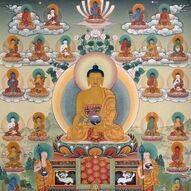|
By Rebecca Gonzalez-Campoy and Rev. KP Hong, Beloved Community Communications Team In his book, Faith Without Certainty: Liberal Theology in the 21st Century, UU theologian Paul Rasor lays out plainly how liberal religion is fraught with challenges to examining spirituality and putting it to work to address racism. He writes:
Unity recently concluded a three-part workshop, “Spiritual Practice: Discovery and Transformation,” that brought participants together in conversation and exploration of how to do what Rasor describes: develop spiritual practices that engage in antiracism work. To be effective, one cannot exist without the other, says Rev. KP Hong, Minister of Faith Formation and one of the workshop leaders. Anything less continues to support white supremacy. This was precisely the question Martin Luther King, Jr., brought into prophetic focus, wondering how spiritual practice on Sunday morning could be emblematic of “one of the most segregated hours” in America, a racialized spiritual practice in collusion with white supremacy. And equally significant, King relentlessly interrogated what racial justice requires and, with other members of the civil-rights generation, formulated nonviolence as the “only weapon that could cut and heal at the same time,” an antiracist practice necessarily grounded in disciplined spiritual practice. Unity provides many opportunities to engage in antiracist multicultural action. This workshop sought to look at the faith formation side of things, and raised many questions as participants considered how to create or enhance their own practices. One example: “How do I know I’m not living out my value of perfection?” Workshop leaders offered this advice: Is your practice me-centered or other-centered? Does it make you just feel good or do you push yourself to go beyond your comfort zone, to push boundaries? To disrupt? Perfectionism is me-centered. When one pursues excellence, it can be we-centered if benefiting others is your goal. Spiritual practice can take many forms. Body awareness work, zazen meditation, prayer, writing, art, walking or working in the natural world, chalice circles, worship, Lectio Divina, and music are among many possibilities. The key here is the word “practice.” Whatever you choose, commit to doing it each day, with intention and discipline. The first session established an understanding of spiritual practice as our way of being with the (w)holy, with what is greater than me and the countless boundaries that we erect to establish, fortify, and protect our preferred sense of self. At its core, then, spiritual practice summons us to the borders of our being, knowing, and ways of moving through the world – whether the borders of my personal identity or my tribe or the checkpoints along the Rio Grande. What happens at the border with the Other and the Not-Me? As King reflected on the Parable of the Good Samaritan, “the first question that the Levite asked was, ‘If I stop to help this man, what will happen to me?’ But then the Good Samaritan came by, and he reversed the question: ‘If I do not stop to help this man, what will happen to him?’” The second session explored what those practices might look like, stepping beyond the border of theory into practice, beyond the border of understanding into experiencing. The third and final gathering brought together spiritual practice and antiracist practice as an inescapable mutuality, a “double helix” in which the parallel helices of spiritual practice and antiracist practice co-create, authenticate, and prophetically keep each other from being co-opted and appropriated by white supremacy encoded throughout our history, culture, and structures. Participants will be invited to a follow-up session in February to review their progress. However, you may attend in February even if you did not take part in the fall series. To find out even more about spiritual practice, check out the Spiritual Practice page on the Unity Website to get some ideas. Of particular interest are the Spiritual Practice Packets organized around our monthly themes. You do not need to be in a chalice circle to use the packet. Find copies in the kiosk in the main lobby and on the Spiritual Practice bulletin board just outside the kitchen. The packet this month centers on the worship theme for October, “confessing.”
0 Comments
Leave a Reply. |
Topics
All
Beloved Community ResourcesUnity Justice Database
Team Dynamics House of Intersectionality Anti-Racism Resources in the Unity Libraries Collection Creative Writers of Color in Unity Libraries The History of Race Relations and Unity Church, 1850-2005 Archives
July 2024
Beloved Community Staff TeamThe Beloved Community Staff Team (BCST) strengthens and coordinates Unity’s antiracism and multicultural work, and provides opportunities for congregants and the church to grow into greater intercultural competency. We help the congregation ground itself in the understanding of antiracism and multiculturalism as a core part of faith formation. We support Unity’s efforts to expand our collective capacity to imagine and build the Beloved Community. Here, we share the stories of this journey — the struggles, the questions, and the collaborations — both at Unity and in the wider world.
The current members of the Beloved Community Staff Team include Rev. Kathleen Rolenz, Rev. KP Hong, Rev. Lara Cowtan, Drew Danielson, Laura Park, Lia Rivamonte and Angela Wilcox. |
